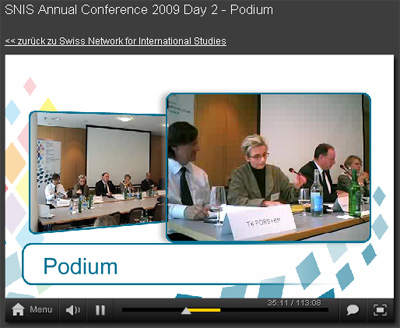
The second day of the SNIS conference was devoted to interaction between the academic and policy worlds (I introduced the conference in my previous post).
While everyone agreed that not all research must necessarily be policy relevant, the participants stressed the need for more cooperation.
The tension between demand-driven research and academic excellence dominated the discussions. On the one hand, research should provide information to help solve practical policy problems. On the other hand however, research must remain independent from the policy realm in order to guarantee objectivity and innovation.
A panelist argued that this tension was very present among European researchers, but that it didn’t bother US academics as much. Fellow Americans, if you read this, how did you solve the problem?
Here are a few (summarized) thoughts from panelists, both academics and policymakers.
- We need to better integrate policymakers into the research process. (Anne-Claude Berthoud, president of the Swiss Academy of Humanities and Social Sciences)
- In order to reach policy actors, researchers must write in an appropriate format, at the right time, in clear language. (Jeff Crisp, Head of Evaluation and Policy Analysis at UNHCR)
- Policy dissemination is just as important as policy formulation. (Also from Jeff Crisp)
- Publishing research can take a very long time. We have to try to speed up the publication of research results. (Thomas Cottier, director of the World Trade Institute)
- Research often lacks strategic orientation and suffers from fragmentation; more cooperation between researchers would be helpful. (Martin Dahinden, director-general of the Swiss Agency for Development and Cooperation)
- While the federal administration is heavily research driven, the problem is among the parliament and the public. They want short, clear, unambiguous positions, which researchers can’t deliver. (Markus Zürcher, secretary-general of the Swiss Academy of Humanities and Social Sciences)
- It is essential to have professionals playing a broker role between policymakers and scientists. They explain and make knowledge accessible to stakeholders while guaranteeing the autonomy of academia. (Paul Messerli, president of the Platform “Science and Policy” at the Swiss Academy of Sciences)
Here’s some further reading if you’re interested in the topic:
“Scientific Evidence for Policy-Making” by the European Commission, 2008.
Thanks to Mrs Berthoud for pointing out this report about “bridging the gap between science and policy.”
Abstract: The central message is that the status quo is unsatisfactory. Much more effort is needed to ensure that project results inform policy-making in a meaningful way. There are contextual, cultural and structural obstacles which need to be overcome in order to achieve the levels of ongoing dialogue and collaboration which are necessary in order to achieve what many writers in the field refer to as real “communities of knowledge.”
“Helping Researchers Become Policy Entrepreneurs”, John Young (Overseas Development Institute), September 2009
Description: This paper summarizes ODI’s work on understanding how policy processes operate in the real world.The paper condenses five years of work into six key lessons that are essential to any researcher or organization wishing to generate evidence-based policy change, and an eight-step approach for policy entrepreneurs wishing to maximize the impact of research on policy. This is known as the RAPID Outcome Mapping Approach (ROMA); RAPID stands for ODA’s Research and Policy in Development Programme.

